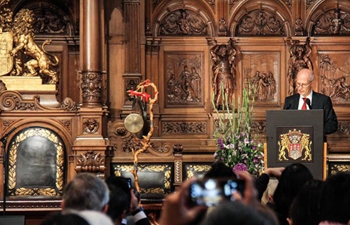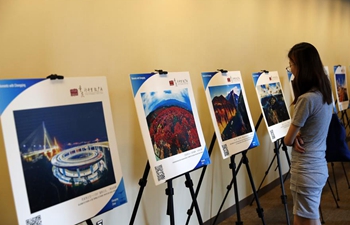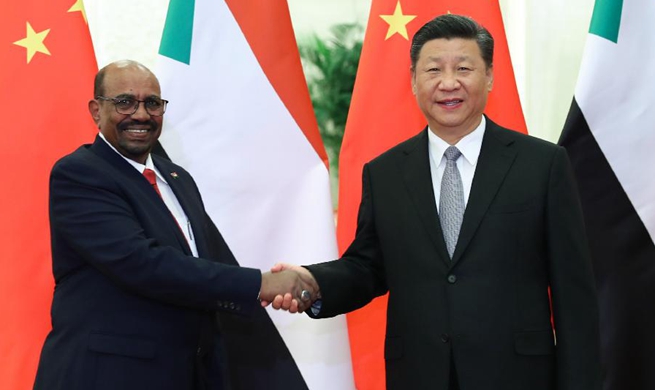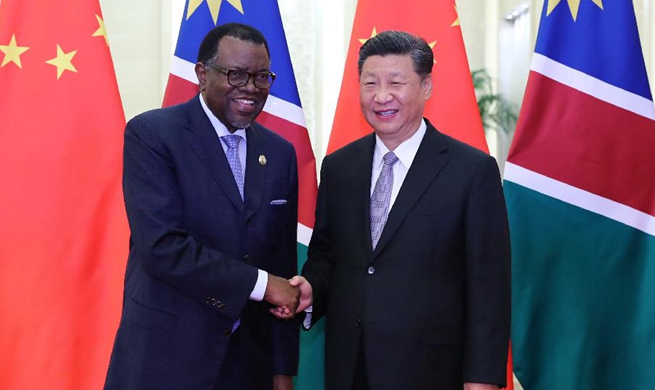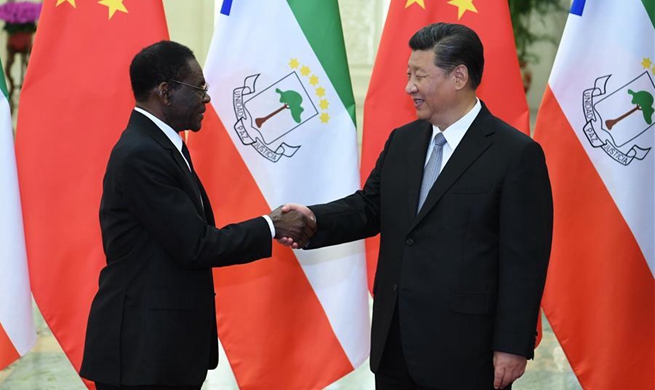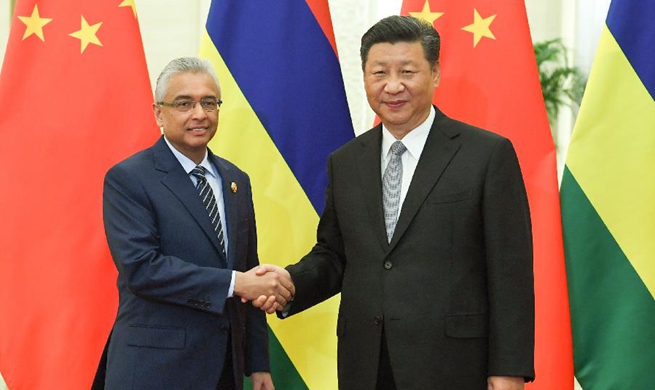BEIJING, Sept. 2 (Xinhua) -- Cameroonian Francis Tchiegue's Beijing life is becoming even busier, due to what he calls his "mission."
As well as filming TV shows such as "Francis Tells Tales" and "Francis' Tricks for Chinese" at StarTimes headquarters in the city, Tchiegue also revises multilingual scripts and drafts.
Tchiegue has lived in China for more than a decade. In 2003, he won a scholarship to pursue his Ph.D. degree in Beijing in an exchange program sponsored by China and Cameroon.
As a huge fan of Chinese culture, he speaks Chinese fluently and has become a TV celebrity adored by Chinese audiences.
Six months ago, Tchiegue started to work full-time as a host and consultant in StarTimes, one of the largest TV service providers in Africa, which is based in Beijing.
"I came to China to see what I can do for media and cultural exchanges between China and Africa, and StarTimes has been dedicated to this kind of work for years and years. That is why I chose to work here," said Tchiegue. "It is my mission."
"To provide affordable and excellent digital TV services for every African family" -- this is the goal that StarTimes set in 2002, which distinguished it from any other television operators in Africa back then.
Now this goal has taken its root in the continent and won broad recognition from the public and various governments.
So far, StarTimes has registered and set up subsidiaries to provide digital TV services for nearly 20 million users in over 30 African countries, including Rwanda, Nigeria, Kenya, Tanzania, Uganda, and South Africa.
Just as its name denotes, StarTimes is a rising star on the continent, presenting images of the world to households across Africa.
The scene of a family gathered in front of the television enjoying a time together is now more and more common in African countries.
THE GAME-CHANGER FROM CHINA
In 2002, when Pang Xinxing, founder of StarTimes, and his team traveled to Africa to assess the market, they were surprised to find that opportunities there were even larger than those in European and American markets.
After consideration, they decided to compete in the digital TV market.
"At that time, digital TV services were a luxury enjoyed by only a small group of people," said Pang, the initial installation fee in many African countries was as high as 200 U.S. dollars and the service cost around 50 to over 100 U.S. dollars per month.
The root cause was monopoly. Big corporations divided and dominated the African market, crushing those who challenged them.
However, when StarTimes arrived they changed the game.
Acting on the philosophy of serving the people through business, StarTimes' service price was reasonable for most ordinary families. The initial installation cost 10 U.S. dollars and the minimum TV package with over 10 channels was charged at 1 U.S. dollar per month.
The game-changing business model was underpinned by its system of technology.
Since 2008, StarTimes has seized the chance to boost investment in TV technology and built four basic networks including signal relay, direct broadcast satellite, digital terrestrial TV transmission and online video.
StarTimes' TV signal now covers the entire African continent.
Over 480 programs in 11 languages from local stations to China's mainstream media, world-famous channels and StarTimes originals are broadcast via the platform, with topics ranging from news, sports, and movies to fashion shows.
Currently, StarTimes is striving to promote its digital TV services in rural areas in Africa, as part of its effort to carry out the "Access to Satellite TV for 10,000 African Villages" project initiated by China in 2015.
It is a challenging job, but for many African people, it is an amazing gift and a gateway to the outside world.
Joseph Runyenje Lopeyok, an ardent soccer fan, lives in Likii village in the central Kenyan county of Laikipia. He was able to watch the World Cup tournament this year thanks to clear signals guaranteed by the StarTimes decoder installed at his backyard.
"Even my wife and daughters who are not normally soccer fans are now enticed by the game," Lopeyok said.
"A NATURAL CONNECTION"
The first time he traveled to Africa, Pang felt a kind of "natural connection between himself and the African people."
"Once I asked an African leader what the most complex human relationship in the world was, and he said without a second thought: that between mother-in-law and daughter-in-law," Pang said, which is an answer echoed in Chinese culture and countless TV shows.
That is also part of the reason why African voice actors and actresses have few cultural barriers in dubbing Chinese TV serials, especially family dramas.
"Compared to many other foreigners, African students are more gifted in learning Chinese, either in terms of pronunciation or comprehension of the language," said Tchiegue.
The connection between Chinese and Africans inspires StarTimes to move forward.
On its 43 original channels, self-made dramas, kung fu shows, dubbing competitions have all been popular among African audience.
To make more Chinese TV shows accessible to African audiences in rural and suburban areas, StarTimes also sent out TV caravans to provide broadcast services.
Wherever the caravans went, children would chase after them and dance to the music they played, and villagers would sit on the chairs they brought with them, happily waiting for the show to begin.
China has been adhering to the principles of sincerity, real results, affinity and good faith in its African policy. In Pang's view, the actual benefits African people can gain from such cooperation are fundamental to the principles.
StarTimes is expanding and pacing up its localization year by year. So far there are over 4,000 employees in Africa, with local employees making up more than 95 percent.
Meanwhile, there are over 7,000 StarTimes agents across Africa, which have generated around 50,000 jobs.
"Any company, if it wants to really take root in Africa, should make an effort to boost social and human development in Africa, and creating more jobs as part of its social responsibility," said Pang.
PRICELESS HAPPINESS
China-Africa relations have reached a stage of growth unmatched in history.
While more and more Chinese visiting Africa, an increasing number of Africans are choosing China as their destination to work and live.
Bolabola Joelle Zita from Gabon has worked as a fashion host and voice actress in StarTimes's Beijing headquarters for seventeen months.
Back in her hometown, Zita was a government employee with a dream to work in the fashion industry.
"I appreciate the opportunity and environment that StarTimes has offered to help me grow as a TV host. It is a company that is willing to teach and listen to you," Zita said.
Now Zita's make-up show S-Belle is broadcast to African audiences via StarTimes channels, even those in remote and small villages.
"I never get bored or tired, because I am doing what I love. TV shows give me a better understanding of the different cultures in Africa and the world," Zita said, adding "It is amazing, isn't it -- getting to know more about Africa in China."
Sitting just next to Zita, Brice Icigumije from Burundi has lived in Beijing for a year and he works on a TV show about movies called "100 Cine."
"I try to give African audiences a glimpse of the latest movies from across the world, and encourage them to go to the cinema," Icigumije said with a smile, "this is a job that I feel passionate about."
As the 2018 Beijing Summit of the Forum on China-Africa Cooperation draws near, Tchiegue has also been helping African embassies in China with receptions and meeting arrangements.
"Many of my friends didn't understand why I went to China rather than European or American countries, but now they are all happy for me because I have finally found something I enjoy doing, which is not about money," he said.
"I hope, through the TV shows we make together, Chinese can get closer to the real Africa and Africans to the real China," Tchiegue said.
Now Tchiegue is looking forward to the upcoming people-to-people and cultural exchange events expected to be announced at the summit.
"I will definitely participate in these events," he said. "It is a kind of priceless happiness."








